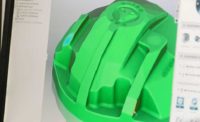Today’s medical devices often feature a number of complex, high-value-added parts. Device manufacturers carefully design these parts before having them molded, machined or assembled.
Pessac, France-based Rescoll Manufacturing addresses this challenge daily as a manufacturer of medical products like spine bolting, maxillofacial surgery instruments, cervical plates and intravenous implants. To produce the best parts for its products, Rescoll engineers use ESPRIT computer-aided manufacturing (CAM) software on the company’s 12 CNC machines.
Several years ago, Rescoll management looked into the benefits of using CAM software when it needed to complete projects involving extensive five-axis milling and surface finishing of parts. The company’s standard approach of manual machine programming proved increasingly difficult and unsuccessful for these projects, according to Fabien Guillaume, methods manager at Rescoll. As a result, the company implemented ESPRIT CAM software (made by DP Technology Corp.) and fully trained Rescoll’s programmers on the software’s turning, milling and multitasking modules.
“Our [goal] was to integrate and adapt CAM to our entire range of Swiss and three- to five-axis machines,” explains Guillaume. “We quickly realized that ESPRIT offers a lot of flexibility and possibilities when programming parts. [It also helps] anticipate errors and optimize setup time on each machine.”
After just a few months, Rescoll dramatically reduced its programming time, enhanced its production and made its CNC machines more intelligent. This latter capability involves performing process archiving and automatic shape recognition, such as for complex 3D surfaces that require five-axis machining on a milling lathe. The software also makes it easier for workers in Rescoll’s Methods department to create standard CNC-machining-process programs.
According to Guillaume, the software has helped Rescoll overcome problems related to weak machines, tight tolerance intervals and refractory materials. It also enables company programmers to diversify part typology, and improve part quality and wear life.
Simulation features within the CAM software allow operators to visualize everything in the area where part machining occurs, including any possible interferences. This capability lets them quickly and easily program part machining with high accuracy.
In addition, the software makes it easy to program trochoidal cutting movements, thereby eliminating all grooving-related problems on Rescoll’s three-axis machines. Guillaume says that ESPRIT even reduces manufacturing process testing times.
Rescoll was founded in 2001 as a private research laboratory that provides chemical and mechanical analysis and testing of materials. Most of its initial work involved the certification of materials for Airbus aircraft, along with testing many polymers for medical implants.
In 2012, the company became ISO13485 certified as a dedicated manufacturer of medical devices. The bulk of its current production is dedicated to medical devices, with the remaining amount used for the aeronautics and robotics sectors.
ESPRIT supports every configuration of CNC machine—from large gantry models and small part Swiss-type lathes, to Swiss-type, millturn, and B-axis multitasking machines—and it enhances a wide range of machining processes. These include two- to five-axis milling; two- to 22-axis turning; two- to five-axis wire electrical discharge; high-speed simultaneous three-, four-, and five-axis toolpath; on-machine inspection (probing); and additive direct energy deposition.
For more information on CAM software, call 800-627-8479 or visit www.espritcam.com.



